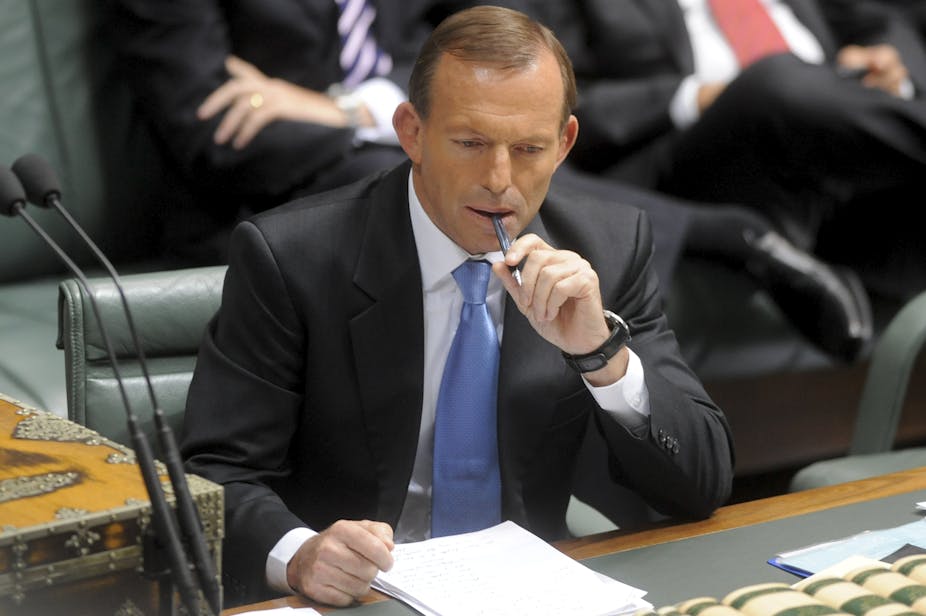Calls for general elections are often made by political parties when things are going well for them. That’s no secret. True to form, opposition leader Tony Abbott has made several appeals to prime minister Julia Gillard’s sense of democracy by imploring her to call an election, and these have become more strident since the leadership spill last week.
At face value these calls appear to be inspired by an authentic belief in democracy. It’s safe to assume, however, given political reality, that Abbott would not be so keen for an election if the polls weren’t in his favour.
Upholding Westminster standards
But let’s assume he is speaking from the heart, and earnestly believes in the people’s right to an election. Would he be any nearer to having expressed an authentic vision of the democratic ideal, one whereby the people are consulted on important matters of national interest?
Westminster-derived parliamentary systems like ours are not premised on the primacy of the general election. Elections are a vital ingredient, but they are not envisaged within that constitutional system to take place at a moment’s notice any time one party thinks its superior polling results will ensure its installation as the next government. This is true even if the empirical soundness of polling were able to be guaranteed, and the public would unquestionably elect an alternative government if given the chance.
To see why, consider the following. In theory, it is possible to call an election just before the passage of every individual bill through the lower chamber, and each election could produce significantly different outcomes for the composition of that chamber. Is it possible elections might be carried so far that their administration would get in the way of any other activity in the political life of the nation? Theoretically, yes.
Under Westminster constitutions, elections come around in broadly regular cycles: cycles long enough to allow the elected government to get a chance to govern. And their regularity may be upset only in exceptional circumstances, for instance when the government loses the confidence of the lower house and a motion of “no-confidence” is carried.
This is a consequence of the particular negotiation Westminster systems achieve between representation and administration. Elections are not the irreducible basis of representative government. The object is to avoid placing any one ideal on a pedestal when there are others which stand to lose a footing if that is done.
It’s true that among the hallmarks of Westminster constitutional systems are democracy, liberty and the rule of law: but none of these ideals is strictly synonymous with the holding of elections or majoritarian rule.
No confidence for reform
What makes Abbott’s latest calls for an election especially difficult to digest is that he continued to make them after losing his bid for a no-confidence motion on Thursday. At the press conference held after the spill, Abbott had this to say:
The only way to give our country the good government that we so badly need right now at a difficult time in the life of our nation is to have an election. We cannot wait until September 14. If the prime minister was concerned about the party, if she was concerned about the country, if she was less concerned about herself and her own survival, there would be an election now.

The timing of these remarks reveals that he has little respect for constitutional convention, and (giving him the benefit of the doubt) might actually want to upgrade those conventions in a way that would make for a more democratic political system. The system isn’t perfect after all.
But it might reveal that Abbott is simply doing what any similarly placed politician would do: exploiting the resonance the idea of an election has with the voting public, while not actually intending to reform the Westminster system in Australia. Let’s not forget that he is a conservative politician.
Grounded in conservative motivations
Abbott’s appeals to democracy are therefore not just likely to be insincere. They also veil an adherence to the past and to the conventional. His book, Battlelines, does give some indication of a reformist spirit, particularly concerning questions such as federal-state relations, but even here his position is not so much reformist as revivalist, in the tradition of Robert Menzies and B.A. Santamaria.
Personally, I am far from seeing 19th century English parliamentary democracy as an untainted example of how to express the democratic ideal. Even our own constitution, which largely ratified that 19th century expression - however well it may have served and continues to serve us - is still in many respects an impossibly 19th century artifact.
But it may as well be bluntly stated that a substantial renovation of democratic practice for the 21st century is not something either the Liberal Party or the ALP would seriously consider.
Tony Abbott’s unheeded calls for an election, though they do point to something about our system that some may find unsettling, are probably coming from the last politician we should expect to ease that unsettling feeling.

